
Product test
A lot of frames for your franc: Intel Core i5-13600K review
by Samuel Buchmann

Intel's new CPU flagship beats the competition from AMD in most benchmarks. In games, it stands out especially for fewer jerks. However, not only the scores are high, but also the power consumption and temperatures.
Intel's Core i9-13900K is the new most powerful consumer desktop CPU. In the test, it reclaims the throne from AMD's flagship Ryzen 9 7950X, which was only allowed to wear the crown for three weeks. The new queen beats the competition in most synthetic benchmarks. In games, it outperforms the 7950X across the board. Particularly striking: The 99 and 99.9 percentiles of the FPS are massively higher on average compared to the competition and the predecessor. This means that there are fewer jerks. Incidentally, the cheaper little sister Intel Core i5-13600K, which I tested here, does almost as well:
Here are the specs of the Intel Core i9-13900K, its direct competitor and its predecessor:
| CPU | Kerne / Threads | Basis- / Boost-Takt | Basis-Leistung | Turbo-Leistung | Cache L2 | Cache L3 | Max. Speicher-Geschwindigkeit |
|---|---|---|---|---|---|---|---|
| Core i9-13900K | 24 (8 P-Cores und 16 E-Cores) / 32 | 3.0 / 5,8 GHz (P)
2,2 / 4,3 GHz (E) | 125 Watt | 253 Watt | 32 MB | 36 MB | DDR5-5600
DDR4-3200 |
| Ryzen 9 7950X | 16 / 32 | 4.7 / 5.7 GHz | 170 Watt | 230 Watt | 16+1 MB | 64 MB | DDR5-5200 |
| Core i9-12900K | 16 (8 P-Cores und 8 E-Cores) / 24 | 3,2 / 5,2 GHz (P)
2,4 / 3,9 GHz (E) | 125 Watt | 241 Watt | 14 MB | 30 MB | DDR5-4800
DDR4-3200 |
The following components I use for the review:
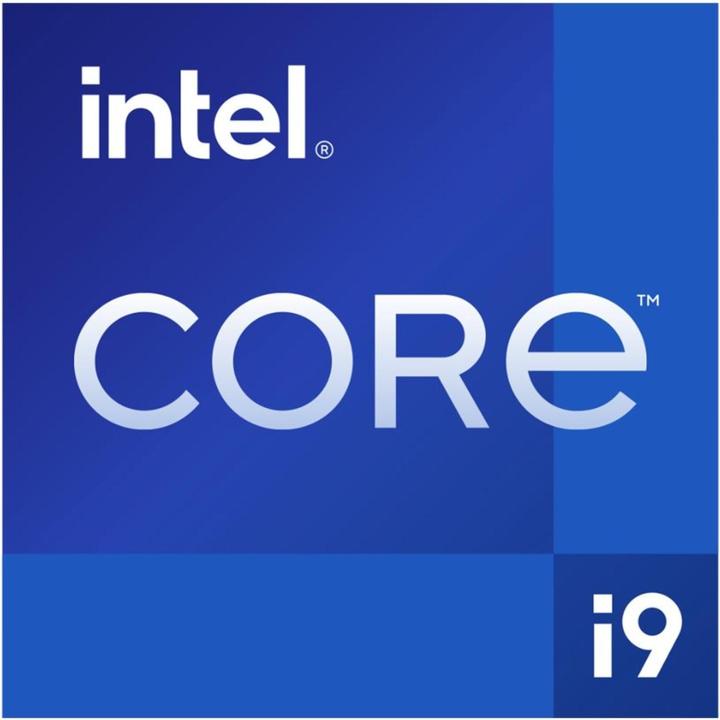
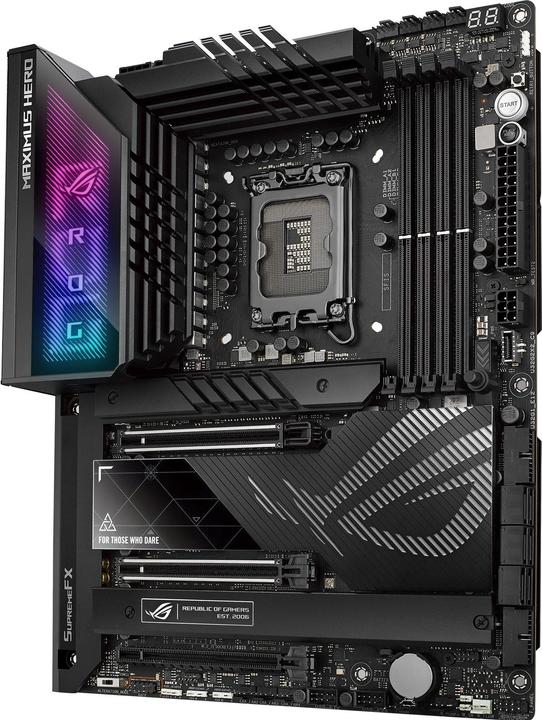
ASUS ROG MAXIMUS Z790 HERO
LGA 1700, Intel Z790, ATX

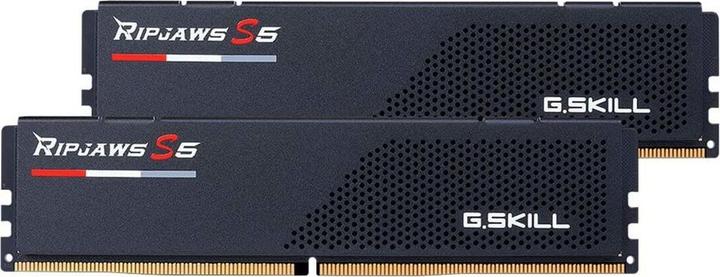




All components were provided to me by the manufacturers for testing. The same RAM, SSDs, cooling and graphics card were used by my colleague Kevin for the tests of the new AMD CPUs and the last Intel generation. These test results serve as comparative data.
In the BIOS, I activate XMP. Otherwise I leave everything on default.
I use BIOS version 0502 and Windows 11 is running version 21H2 (22000.1098).
Here is an overview of the various benchmarks:
I run all benchmarks three times and take the best result. For the games, I use the highest possible default settings. Otherwise, I leave everything at default except for the resolution.
Cinebench R23 tests how a CPU performs when rendering 3D models. From these calculations, the benchmark creates scores for single and multi core performance.
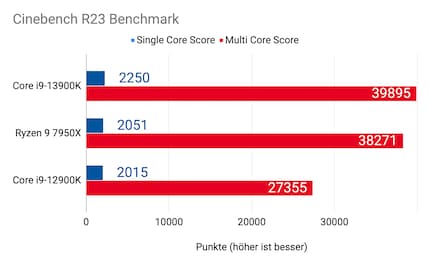
In the benchmark, the 13900K achieves a Single Core Score of 2250 and a Multi Core Score of 39 895, making the Intel CPU almost ten per cent better in Single Core than AMD's 7950X. In Multi Core it is still four percent. Compared to the predecessor 12900K CPU, the increase is twelve per cent in Single Core and 46 per cent in Multi Core - but the 12900K has eight fewer threads available than the others.
The CPU-Z benchmark tests the speed in single core and multi core of a CPU and creates an overall score from it.
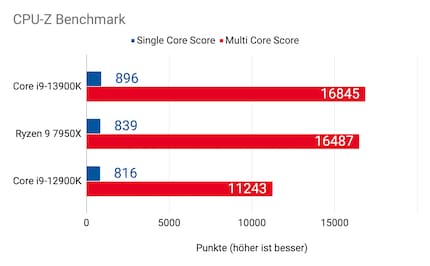
In Single Core, the 13900K achieves seven percent more points than the AMD competition and ten more than its predecessor. In Multi Core, the lead over AMD shrinks to two per cent, while that over its predecessor grows to 50 per cent due to the eight extra threads.
The integrated benchmark of 7-Zip tests a system for the compression and decompression of data. From this, it calculates a score in giga instructions per second (GIPS). I choose the default "Dictionary size" of 32 megabytes.
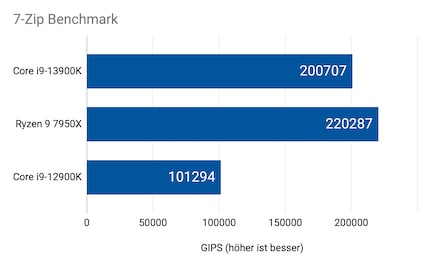
7-Zip is one of the only benchmarks where Intel's flagship remains slower than AMD's. The 13900K scores nine percent lower. Compared to its predecessor, however, it is almost twice as fast.
The Blender Benchmark renders three scenes in version 3.3 in the 3D graphics suite and calculates three scores from them. I add each of these up to a final score
.
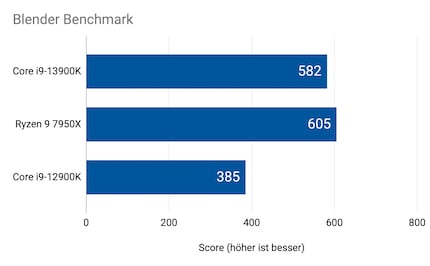
Intel also lags behind AMD in Blender by three percentage points, but boosts performance by a whopping 51 per cent compared to the last generation.
Puget Systems' Photoshop benchmark runs a variety of workloads. You can find more detailed info here. At the end, the benchmark calculates a score based on a reference workstation
.
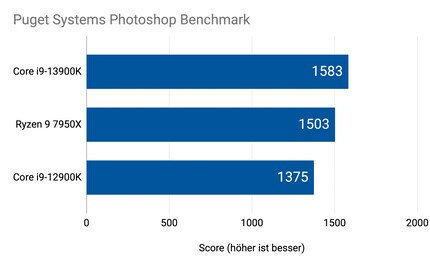
In Photoshop, the increase over the predecessor CPU is not as great as in other places. The 13900K achieves 15 per cent more points. Compared to AMD's competition, it's five per cent more.
Puget Systems' Premiere benchmark runs a variety of workloads. You can find more detailed info here. At the end, the benchmark calculates a score based on a reference workstation
.
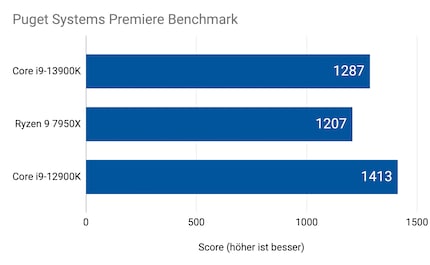
In Premiere, Intel's new CPU is seven percent faster than AMD's 7950X. But the fact that the score is nine per cent less than its predecessor makes little sense. I suspect that Premiere has not yet been optimised for the new processors. So this benchmark should be taken with a grain of salt.
The PCMark 10 benchmark tests various scenarios such as the loading time of apps, efficiency in spreadsheets, browsing or even photo and video editing. In other words, it tells us how well a processor is suited for office work. From this, it calculates a score.
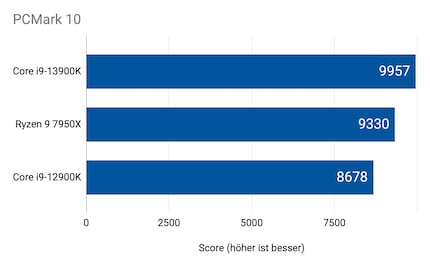
In PCMark, the lead over AMD is seven per cent, over the Intel CPU of the last generation it is 15 per cent.
The synthetic game benchmarks give a first glimpse of performance in games. I do not include the Overall Score, which is calculated from the results of the graphics card and CPU. This is because I want to exclude the performance of the GPU for CPU reviews.
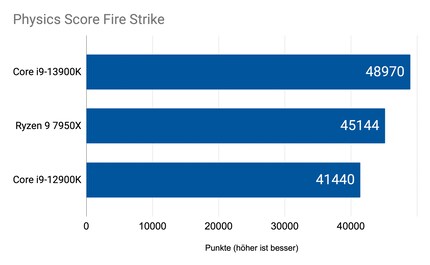
Across the four benchmarks, the 13900K scores nine percent higher than the 7950X. Compared to the predecessor CPU, it scores 18 percent more.
Synthetic benchmarks are only of limited value, however, and do not speak the whole truth. More important is how the CPU performs in games.
Since we don't have the option of picture galleries, I won't list the individual results of the games here. You can download all the benchmarks here. The following tables show the arithmetic mean of the nine benchmark games. I am aware that CPU performance is most relevant at 1080p resolution and below. Nevertheless, I test 1080p, 1440p as well as 2160p resolution. My reasoning: you don't buy a latest-generation CPU and then play in 720p resolution.
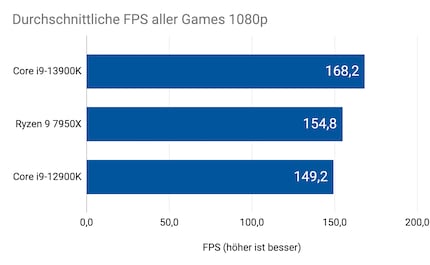
Across all resolutions, the 13900K delivers more FPS on average than the competition and its predecessor. As expected, the differences become smaller at higher resolutions. In 1080p resolution it's nine per cent, in 1440p six per cent and in 2160p three per cent compared to AMD's 7950X. Compared to the 129000K, it's 13, eight, and four per cent.
The higher average frames per second run through all the games tested, although the lead varies. What is surprising, however, is not the average FPS, but the 99 and 99.9 percentiles. These values show how much jerkiness can occur in games. In this area, the 13900K pulverises both competition and predecessor: the arithmetic mean of all games in all three resolutions is 29 percent higher in the 99th percentile and 48 percent higher in the 99.9th percentile than AMD. Compared to the 12900K, it's 19 and 29 percent, respectively.
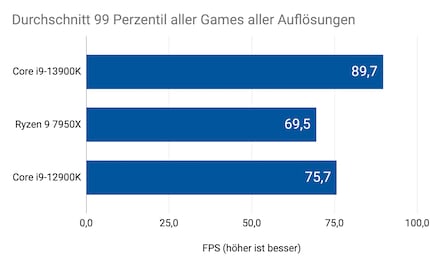
The 13900K gets hot. During a ten-minute multi-core stress test in Cinebench R23, temperatures in the individual cores reach up to 100 degrees Celsius, whereupon the CPU clocks down and then oscillates between 5.2 and 5.5 GHz. When asked, Intel says that they recommend a 360mm all-in-one water cooling system for the i9, which is supposed to prevent the temperature peaks. However, I have not yet been able to test this myself. The power requirements are just as high as the temperatures: the 13900K calls up to 300 watts under full load.
.
Even with the 240mm cooling, the CPU only reaches its thermal limit in extreme situations. In normal operation and in games, the temperatures and power requirements are relative. In idle, the temperature is 37 degrees at 25 watts, during the PCMark test 45 degrees at 41 watts. In games, the values vary greatly, but are usually around 50 degrees at less than 100 watts. Very demanding games can sometimes require 120 watts and cause peaks of 70 degrees.
Nevertheless, the i9 CPU is not particularly efficient for office use: at 35 watts, the 24 cores still eat up almost twice as much as, for example, its little sister i5 13600K with 14 cores, which manages with only 20 watts in such situations. However, this puts the 13900K in good company, as AMD's 7950X has a similar power requirement.
.
So the range of temperatures is gigantic and even greater than AMD's flagship, which also already draws up to 230 watts. Both values are higher than those of the predecessor models - but are only reached when the CPUs have to call up maximum power for a longer period of time.
Intel's new Core i9 CPU beats the competition from AMD in virtually all respects when it comes to gaming performance. In particular, at the 99th and 99.9th percentiles, the 13900K completely pulls away from the Ryzen 9 7950X and also its own 12900K predecessor. This is presumably due to the larger L2 cache, which ensures less jerkiness. With these results, Intel's new flagship is clearly better than AMD's Ryzen 9 for gaming. The matter is less clear in productivity benchmarks, where AMD is ahead in two cases and the lead in the remaining benchmarks is in the single-digit percentage range. The downside of all this performance: the 13900K is even more power-hungry under full load than the 7950X.
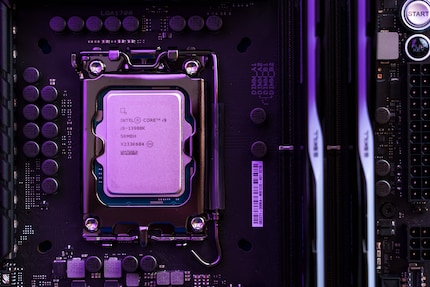
At 690 francs, the Intel Core i9-13900K costs less at launch than the AMD Ryzen 9 7950X, whose price has dropped from 849 to 763 francs in the three weeks since it went on sale. The only remaining argument for AMD is that their new AM5 socket should be more future-proof than Intel's LGA1700, which will probably be replaced after this generation. With AMD, you can probably keep adding newer CPUs for the next three years. At the moment, however, Intel's flagship delivers more performance for less money and is even more backwards compatible with the cheaper DDR4 RAM and corresponding motherboards. This makes the 13900K an attractive upgrade option for existing systems with socket LGA1700, although small performance losses compared to DDR5 and new chipsets are certainly to be expected.
However, if you don't have an unlimited budget and mainly want to game, you're probably better off with the competing CPU from Intel's own house: The Core i5-13600K has the better price-performance ratio, especially for gaming - more on that in this review. A successor to the AMD Ryzen 7 5800X3D is also expected next spring. The CPU with 3D stacking technology should deliver even more gaming performance than Intel's new flagship. But if you're building a new high-end PC today and want to get the last few FPS out of games, the Intel Core i9-13900K is the first choice.
My fingerprint often changes so drastically that my MacBook doesn't recognise it anymore. The reason? If I'm not clinging to a monitor or camera, I'm probably clinging to a rockface by the tips of my fingers.